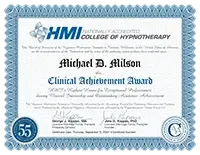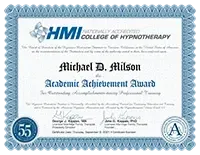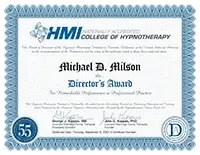
What You Need to Know About Hypnosis Certification in Michigan
Are you considering a career in hypnosis or hypnotherapy? One of the first questions you might have is, “What do I need to get certified?” If you’re in Michigan, you’re in the right place!
Hypnosis certification is often seen as a way to build credibility, but it’s important to understand its limitations. In most places, certification is not legally required or regulated, and it doesn’t provide skills—those come from the quality of the training you receive. Certification can sometimes impress laypeople or other hypnotists familiar with certain organizations, but in many cases, it’s just a piece of paper or digital badge that holds little real significance. What truly matters is the depth and quality of your training, as well as your ability to apply that training effectively in real-world scenarios with clients. Success in helping people requires not just knowledge but the ability to adapt techniques, build rapport, and create meaningful, lasting change for each individual you work with.
We’ll explore everything you need to know about hypnosis certification in Michigan, from laws and regulations to choosing the right training program. And don’t miss our free checklist for choosing a high-quality hypnosis training program—Can't wait? Download it now using the link below.
Do You Need Certification to Practice Hypnosis in Michigan?
The short answer: No, certification is not legally required to practice hypnosis in Michigan or most places around the US and beyond.
However, while hypnosis is largely unregulated in many places, there are still important considerations:
Scope of Practice: Hypnotists should not diagnose, treat, or claim to cure any medical or psychological condition unless licensed to do so through another modality. Instead, they should focus on helping clients achieve personal goals, like improving confidence, quitting smoking, overcoming limiting beliefs, or reducing stress. For issues with potential medical or psychological origins, hypnotists should work in cooperation with licensed healthcare professionals to ensure hypnosis is not contraindicated, and for the best benefit of the client.
Titles: While there’s no explicit prohibition against using terms like "therapist" in most places, some practitioners prefer to avoid them unless they hold relevant licenses. Safer options include "Hypnotist," "Consulting Hypnotist," or "HypnoCoach." Many certification organizations often guide what titles you can use based on their individual policies.
Clients, Not Patients: Hypnosis professionals refer to those they help as "clients," not "patients," unless they hold a license that allows for such terminology.
All of the above is done as one of several steps taken to avoid being accused of practicing medicine without a license and keeping the safety of your clients forefront.
Understanding Hypnosis Certification
Hypnosis certification varies greatly depending on the organization providing it. Here’s what you need to know:
Lack of Standardization: Certification often depends on the organization’s standards, which range from rigorous to nonexistent. While some require thorough training and assessment, others may grant certification to anyone who pays a fee.
Purpose of Certification: Certification is less about impressing clients (most don’t ask about your credentials) and more about:
Showing professionalism to peers.
Gaining membership in professional organizations.
Accessing resources, training, and networking opportunities.
What to Look For: Choose certifications tied to programs that vet your skills and ensure quality training. Some certifications provide additional benefits, such as directories, materials, or events, while others simply hand you a certificate.
Are There Laws Governing Hypnosis in Michigan?
While Michigan doesn’t heavily regulate hypnosis, here’s what to keep in mind:
No HIPAA Protections: Unlike medical professionals, hypnotists are not bound by HIPAA laws. However, maintaining client confidentiality is still essential for building trust. Keep records secure and private, and comply with any legal requests for information. Some hypnotists choose to keep as little information as possible to avoid having anything needing secured or to have to divulge on legal request. Some don't even take notes during sessions.
Ethical Guidelines: Most ethical practitioners follow professional standards, such as obtaining informed consent and refraining from misleading claims. Often a good certifying organization will have a set of ethical standards they require you to adhere to to remain a member in good standing.
Reporting Requirements: Unlike licensed healthcare providers, hypnotists are not legally obligated to report abuse or other concerns. However, many do so as part of their ethical practice and all of this should be told to a client upfront to keep things transparent and honest.
Insurance: Holding business and liability insurance tailored to hypnosis is strongly recommended. This can protect you and your clients in the rare event of legal or safety issues.
How to Choose a High-Quality Hypnosis Training Program
Not all training programs are created equal. Here are the core areas to evaluate:
Accreditation: While many hypnosis programs claim accreditation, it’s often from private organizations rather than government bodies. Accreditation can indicate quality, but it’s not a guarantee. So, don't base your choice solely on accreditation. Many fine training programs have no accreditation whatsoever but have a comprehensive curriculum and an amazing trainer(s).
Curriculum: Look for programs that go beyond rigid scripts and those teaching you to read at your client. The best training teaches principles, techniques, and how to adapt sessions based on client needs. How to watch and listen to the client for subtle clues as to where things need to go next. Things you cannot do if your head is down reading a pre-scripted session.
Hands-On Training: In-person or live online practice with real clients is crucial for mastering hypnosis skills. Even if this is other students that you are working with, you need to practice everything you are being taught. It can't just all be theoretical.
Instructor Credentials: Verify that your trainer has real-world experience seeing clients and an established reputation in the field. As well as having taken quality training themselves, preferably from multiple different places, and continues to do so.
Support After Graduation: Will the program provide ongoing resources, mentorship, a community, or business and marketing advice?
To ensure you choose a program that meets these standards, download our comprehensive checklist now.
Benefits of Certification
While certification is not legally required, it can sometimes offer advantages:
Professional Credibility: Certification helps you stand out, especially when networking, applying for professional memberships, or seeking to give talks at businesses and events.
Resources and Opportunities: Some certifications come with access to training materials, events, and communities of practitioners. Which can sometimes be useful and sometimes just be padded fluff, things you already know from your training, things you don't even need to know, or in some cases it can be outdated content that hasn't been updated since it was first created.
Personal Confidence: Becoming certified can reassure some people and give them a greater sense of achievement, a kind of further recognition of their worthiness to do what they are doing.
Remember, certification won’t guarantee success. Clients rarely care about your credentials—they care about results. Focus on honing your skills and building a practice that delivers value and results.
Steps to Become Certified in Hypnosis
Since certification requirements vary widely, here are some general steps to follow:
Choose a Reputable Training Program: Look for programs with 100-300 hours of training, hands-on practice (online, offline or hybrid), and a strong curriculum covering a selection of relevant topics. Preferably one not wasting too much of your time on learning useless history or relying solely upon reading scripts.
Complete the Training: Some programs certify you directly upon completion, while others may connect you with a third-party organization they are affiliated with, some may only give you a certificate of completion, and you will be required to check in advance that a specific certification organization you want to join will accept the training you plan to take, before investing your time and money.
Obtain Certification: Certification may involve just completing the training and passing an exam, submitting case studies, showing proof of passing a course, demonstrating your skills to someone, or in many cases it will just involve simply paying a fee.
Build Your Practice: After certification, remember that you are just beginning your journey and your next step will be to actually build a successful practice. This may involve creating a website, establishing social media profiles, and starting to market your services. Things which many people will have already begun to do at the beginning of their training. As most good training will encourage you to get out there and start working with people for certain things, as soon as you have learned the basics. Gradually working your way up to more challenging clients as your knowledge and skill level improves.
Training in hypnosis is the most valuable step for building your skills and while obtaining a certification can help with credibility in some circles, it’s not a major factor in your success. By understanding Michigan’s laws and choosing a high-quality training program, you’ll set yourself up for a fulfilling career in hypnosis.
Don’t forget to download our free checklist for choosing a hypnosis training program to make your decision easier!




